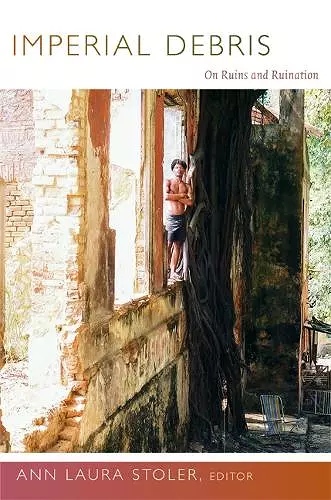Imperial Debris
On Ruins and Ruination
Format:Paperback
Publisher:Duke University Press
Published:10th May '13
Should be back in stock very soon

Imperial Debris redirects scholarly focus away from ruins as evidence of the past to "ruination" as the processes through which imperial power occupies the environment, and bodies and minds, in the present.Imperial Debris redirects critical focus from ruins as evidence of the past to "ruination" as the processes through which imperial power occupies the present. Ann Laura Stoler's introduction is a manifesto, a compelling call for postcolonial studies to expand its analytical scope to address the toxic but less perceptible corrosions and violent accruals of colonial aftermaths, as well as their durable traces on the material environment and people's bodies and minds. In their provocative, tightly focused responses to Stoler, the contributors explore subjects as seemingly diverse as villages submerged during the building of a massive dam in southern India, Palestinian children taught to envision and document ancestral homes razed by the Israeli military, and survival on the toxic edges of oil refineries and amid the remains of apartheid in Durban, South Africa. They consider the significance of Cold War imagery of a United States decimated by nuclear blast, perceptions of a swath of Argentina's Gran Chaco as a barbarous void, and the enduring resonance, in contemporary sexual violence, of atrocities in King Leopold's Congo. Reflecting on the physical destruction of Sri Lanka, on Detroit as a colonial metropole in relation to sites of ruination in the Amazon, and on interactions near a UNESCO World Heritage Site in the Brazilian state of Bahia, the contributors attend to present-day harms in the occluded, unexpected sites and situations where earlier imperial formations persist.
Contributors. Ariella Azoulay, John F. Collins, Sharad Chari, E. Valentine Daniel, GastÓn Gordillo, Greg Grandin, Nancy Rose Hunt, Joseph Masco, Vyjayanthi Venuturupalli Rao, Ann Laura Stoler
"Imperial Debris questions some of our deepest assumptions about violence and its residues. This astute, wide-ranging, and ambitious volume refocuses our attention on the incremental processes of ruination that are typically overlooked in favor of official ruins. The result is a major intervention in postcolonial and visual studies."-Rob Nixon, author of Slow Violence and the Environmentalism of the Poor "Barely controlled rage is never far offstage as we are drawn into the continuing drama of empire's ruins-scarred landscapes, polluted places, shattered peoples, and the rot that remains. From sadistic torture and ruination of bodies and souls in the (Belgian) Congo to the lives of Sri Lankan 'coolie' estate workers analyzed in epic poetry, from the state’s attempt to patrimonialize impoverished citizens in contemporary Bahia to Israeli destruction of Palestinian homes and spirits in Gaza, this book forces a new, critical gaze on the ways that colonialism lives on in the present."-Richard Price, author of The Convict and the Colonel, Travels with Tooy, and Rainforest Warriors “The contributors analyze enduring ‘rot’ and ‘debris’ in a variety of global settings . . . . Highly recommended. University collections, all levels.” - P. C. Naylor (Choice) “This rich volume provides valuable material for reflection by readers concerned with the effects of colonialism, with the ruination not only of buildings but of social relations and social groups. . . . It includes several rich interventions from which historians and others can benefit greatly.” - Rashid Khalidi (American Historical Review) “This is a book of weight and consequence. . . . Stoler has curated as much as edited a volume that, writing against a certain silencing of the present, examines ruination as an ongoing process in the aftermath of empire.” - Richard Pithouse (Canadian Journal of History) "Critical, theoretically sophisticated, and full of fascinating scholarship. . . . This is a weighty and important volume . . . which will leave its trace in American Studies, postcolonial studies, heritage studies, and the ecological humanities." - Gesa Mackenthun (Amerikastudien)
ISBN: 9780822353614
Dimensions: unknown
Weight: 522g
277 pages